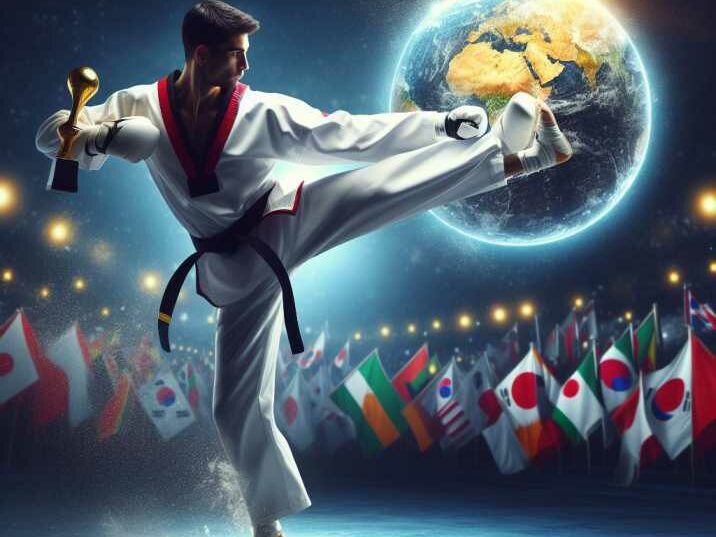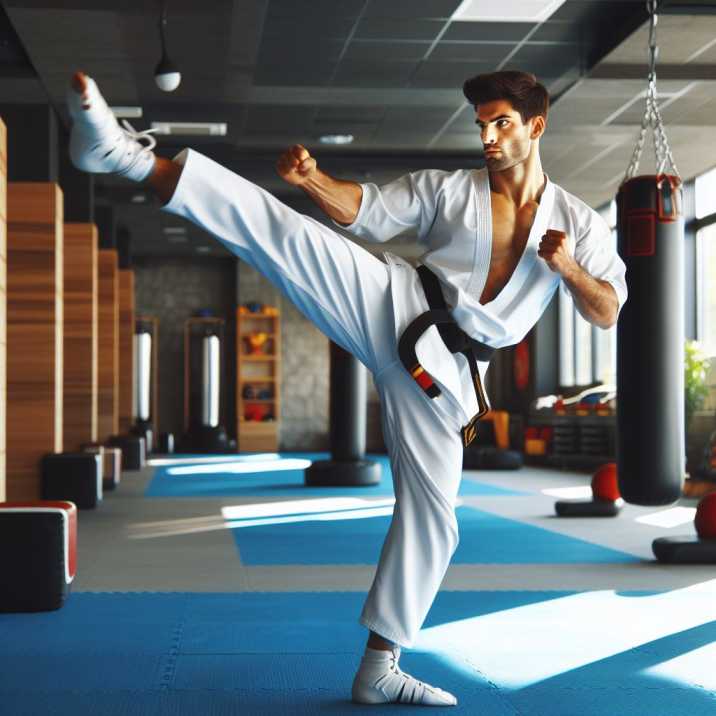Introduction
Table of Contents
Qualify for Olympic Taekwondo
Embarking on the journey to qualify for Olympic taekwondo is a monumental task that demands dedication, discipline, and passion. In this comprehensive guide, we will unravel the intricate process of earning a spot in the prestigious Olympic taekwondo competition. Whether you’re a budding athlete or a seasoned practitioner, this roadmap will equip you with the knowledge needed to step onto the world’s grandest sporting stage.
Understanding Olympic Taekwondo
Taekwondo, a Korean martial art, made its Olympic debut in 2000, captivating audiences worldwide with its dynamic kicks and strategic maneuvers. Before delving into the qualification process, it’s crucial to grasp the essence of Olympic taekwondo. From its rich history to the rules governing the sport, we’ll lay a solid foundation for your journey.
Commitment to Training
Hone Your Skills with Rigorous Training
To qualify for Olympic taekwondo, one must undergo intense training regimens. This involves mastering the core techniques of taekwondo, including punches, kicks, and defensive moves. World-class coaches and trainers play a pivotal role in sculpting athletes into formidable competitors.
Utilize State-of-the-Art Training Facilities
Access to top-notch training facilities is indispensable. Institutions like the Taekwondo Training Centers and Olympic Training Centers offer athletes the necessary infrastructure and expertise to refine their skills.
Competition Circuit Navigation
Participate in National Competitions
The journey to the Olympics often begins at the national level. Competing in national championships not only sharpens your skills but also serves as a gateway to international exposure.
Excel in International Competitions
Success at the international level is a key determinant for Olympic qualification. Accumulating ranking points in events like the World Taekwondo Grand Prix and World Taekwondo Championships elevates your standing in the global taekwondo community.
Qualification Pathways
Olympic Rankings and Points System
Understanding the Olympic rankings and points system is crucial. Points earned in sanctioned events contribute to an athlete’s standing, making it essential to strategically choose competitions based on potential point gains.
Continental Qualification Tournaments
Continental qualification tournaments are a direct pathway to the Olympics. Winning or securing a top position in these events guarantees a spot in the Olympic taekwondo competition.

Mental Preparation
Develop a Strong Mindset
Olympic taekwondo requires not only physical prowess but also mental resilience. Athletes must cultivate a strong mindset to navigate the pressures of high-stakes competitions.
Visualization Techniques
Visualization techniques can aid in mentally rehearsing and preparing for matches. Athletes often use imagery to simulate the intensity of the Olympic stage, ensuring they are mentally prepared for the grandeur of the event.
Maintaining Physical and Mental Health
Optimal Physical Fitness
A rigorous training routine should be complemented by a focus on overall physical health. Regular check-ups, proper nutrition, and adequate rest are imperative to sustaining peak performance.
Mental Health Awareness
The intensity of Olympic-level competition can take a toll on an athlete’s mental health. Recognizing the importance of mental well-being and seeking professional support when needed is essential.
The Role of National Olympic Committees (NOCs)
Collaboration with NOCs
National Olympic Committees play a pivotal role in supporting athletes on their Olympic journey. Collaborating with NOCs ensures access to resources, funding, and logistical support required for successful qualification campaigns.
Overcoming Challenges
Dealing with Injuries
Injuries are an inherent part of any athlete’s journey. Learning how to cope with and recover from injuries is a skill that sets apart the resilient contenders from the rest.
Navigating Competition Politics
Navigating the politics within the taekwondo community can be challenging. Building positive relationships and maintaining a professional demeanor is key to garnering support.
Conclusion
In conclusion, the path to Qualify for Olympic Taekwondo is a challenging yet rewarding journey that requires a strategic approach, relentless dedication, and a holistic focus on physical and mental well-being. The seven proven steps outlined in this guide provide a roadmap for athletes aspiring to reach the pinnacle of their sport.
Starting with a thorough understanding of Olympic taekwondo’s essence and rules, athletes must commit to rigorous training regimens and utilize top-notch facilities. Participation in national and international competitions, coupled with a keen awareness of the Olympic rankings and points system, serves as a stepping stone towards qualification.
Mental preparation is equally vital, requiring athletes to develop a strong mindset and employ visualization techniques to navigate the intense pressures of high-stakes competitions. Prioritizing physical and mental health, collaborating with National Olympic Committees, and overcoming challenges such as injuries and competition politics are integral aspects of the qualification journey.
As athletes strive to balance physical and mental well-being, collaboration with National Olympic Committees becomes pivotal. These organizations play a significant role in providing the necessary support, resources, and logistical assistance that can make a difference in an athlete’s quest for Olympic qualification.
The inclusion of frequently asked questions addresses common queries and concerns, offering additional insights into the intricacies of the qualification process. Whether an athlete faces setbacks or seeks to reattempt Olympic qualification, resilience and determination remain the driving forces behind success in the dynamic world of taekwondo.
In the end, while the journey to qualify for Olympic taekwondo is arduous, it is also a transformative experience that molds athletes into champions. Aspiring taekwondo practitioners can draw inspiration from the stories of those who have navigated this path before, understanding that each challenge is an opportunity for growth.
As the taekwondo community continues to evolve, this guide stands as a beacon for those who dream of gracing the Olympic stage. By following these seven proven steps, athletes can not only qualify for Olympic taekwondo but also contribute to the rich tapestry of this ancient martial art’s legacy on the world’s most prestigious sporting platform. With determination, resilience, and a strategic mindset, the journey to Olympic success in taekwondo becomes an achievable reality.

Frequently Asked Questions (FAQs):
- Q: How do I qualify for Olympic taekwondo?
- A: Qualifying for Olympic taekwondo involves a multi-faceted approach, including rigorous training, participation in national and international competitions, and strategic collaboration with National Olympic Committees.
- Q: What role do national championships play in the qualification process?
- A: National championships serve as a starting point for many athletes, providing a platform to showcase their skills and qualify for higher-level competitions.
- Q: How important is mental preparation in Olympic taekwondo?
- A: Mental preparation is paramount in Olympic taekwondo. Athletes must cultivate a strong mindset to navigate the pressures of high-stakes competitions.
- Q: Can injuries hinder the qualification process?
- A: Injuries are a common challenge for athletes. Learning to cope with and recover from injuries is crucial for a successful Olympic qualification journey.
- Q: What role do National Olympic Committees play in an athlete’s journey?
- A: National Olympic Committees provide crucial support, including resources, funding, and logistical assistance, to athletes on their Olympic qualification journey.
- Q: Are visualization techniques effective in taekwondo training?
- A: Yes, visualization techniques are widely used in taekwondo training to mentally rehearse and prepare for high-stakes competitions, such as the Olympics.
- Q: How can athletes navigate competition politics in taekwondo?
- A: Navigating competition politics requires building positive relationships and maintaining a professional demeanor within the taekwondo community.
- Q: What is the significance of continental qualification tournaments?
- A: Continental qualification tournaments provide a direct pathway to the Olympics, with victory or top placements securing a spot in the Olympic taekwondo competition.
- Q: Is collaboration with NOCs necessary for Olympic qualification?
- A: Yes, collaborating with National Olympic Committees is essential for athletes to access resources, funding, and logistical support required for a successful Olympic qualification campaign.
- Q: How can athletes balance physical and mental health during training?
- A: Balancing physical and mental health involves maintaining optimal fitness, regular check-ups, proper nutrition, and seeking professional support when needed.
- Q: Can athletes reattempt Olympic qualification after setbacks?
- A: Yes, athletes can reattempt Olympic qualification after setbacks. Resilience and determination are key attributes in overcoming challenges on the journey to the Olympics.
- Q: Are there age restrictions for Olympic taekwondo qualification?
- A: While there are no specific age restrictions, athletes must meet certain criteria outlined by the International Olympic Committee (IOC) for participation in the Olympic Games.


